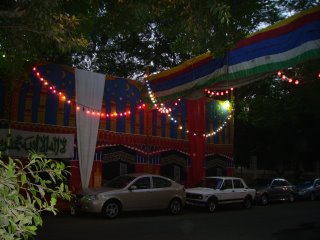
Hello from a major holiday in Egypt. October 6 is the anniversary of a military victory in the Egypt-Israel war of the 1970s, which brought the Sinai back under Egyptian control—or, as our office mate Ahmed says, back “home.” There is a street named 6th of October St., and even a new suburb near the pyramids called 6th of October City. Can you imagine a town named 4th of July City?
Yesterday afternoon, M and I were on our way to the Alfa Mart when we were waylaid by two—count them, two—letters, both for M, one from her mother, the other from her grandmother. They were sitting on a ledge in the foyer, which I guess counts as our mailbox. We sat down on the front steps to read them, which gave our bawaab the time to sense our presence and motion to us furiously from down the block. As usual, I engaged in a series of gestures meant to pantomime my ignorance. Mission accomplished: bawaab makes the universal “sign of the camera” with thumb and forefinger, then motioned to the sidewalk charity tents that had been erected for Ramadan, just across the street next to the all-girls’ school. Back up the rickety elevator I go to our apartment, where I grab the camera—M is still reading kinds words from Betty—and hurry back downstairs. And bawaab ushers us inside this tent, onto the sidewalk where tables and chairs have been arranged. Such public dining halls are common throughout Ramadan, as they are for the poor who cannot afford a proper meal at Iftar—that magical time of the day when Muslims break their fasts. This also means that there are people cooking these meals, which is generous under normal circumstances, but Herculean when one considers that the cooks are all fasting. Bawaab leads me to a tented enclosure within the larger tent, where a group of men are cooking chicken and fuul (pronounced “fool”) and rice. These are some friendly and, as you can see, photogenic older men, glad, it seems, for the recognition.
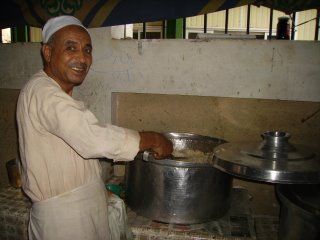
Throughout this experience, and the ones to follow, I kept wondering why our bawaab has brought me here. Had he been looking for me all day, or had the idea occurred to him only after he saw us on the front steps? Why does he want me to document this in photographs? M thinks that some Muslims want Westerners to see their religion and its traditions in positive ways. At the very least, I have sensed that many Egyptians feel that their religion has been misappropriated by a violent minority, to serve purposes most Muslims also find abhorrent. Is this what our bawaab is thinking as he guides us “behind the scenes” at the charity tent? Probably not in those words.
Anyway, we return from Alfa Mart just before the Iftar. I can hear on the city-wide loudspeakers the haunting music and low, male singing that represents, I think, anticipation of the moment itself—the blaring voice commencing Iftar. One of the other bawaabs, an older man who wears a security uniform, and who I have never seen standing, waves at us to come down, to eat. Once more, I pantomime: I point to our groceries, point up, point at myself, and then, after pausing, point at him. Then we race upstairs to put away our food, race back down with two bottles of water; we give one of these to the old, seated bawaab, and leave the other inside the charity tent, which is now full with people waiting to break their fast.
We find our bawaab scampering energetically a bit further down the block, out in front of the makwagi shop, where I have my clothes ironed. Our bawaab often scampers energetically, by the way. At this time, he’s busily setting a table that has been put on the sidewalk outside the makwagi. First, the surface is covered in old newspaper. Then, from the bowels of the makwagi shop, among the ironing boards, there appears as if by magic a heaping bowl of rice, a huge plate of beef—a true delicacy here in Egypt—and smaller plates of raw and cooked vegetables. Bawaab and others produce used Aquafina bottles of ice water, soaked all day in lemon—this not only makes them tasty, but also ensures certain death for any roaming bacteria. We take our seats; I’m across from the old makwagi himself, who very intently stares down at the food and waits for the signal. Other than the old man, M and myself, the others (all men) are standing by the table. Just before the Iftar commences, our bawaab places balady bread beside our plates. Balady bread, for those of you who do not know, is like pita bread, only more bittersweet.
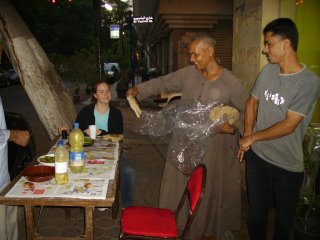
Dig-in time is just that: the speakers blared the voice announcing the onset of Iftar, and the men around us poured cups full with lemon water and downed them in a single gulp. Then they tore the balady bread and used it to grab a hunk of meat, or some vegetables, or a handful of rice, and—gulp—disappeared. The makwagi kept motioning to M that she should eat some meat, and we tried, rather sneakily, a technique we learned in the Culture Shock book—M takes the meat, along with other items she will eat, and tries, inconspicuously, to “forget” her meat—or, when the makwagi continually insisted she eat meat (again, any meat is a delicacy in Egypt, very expensive for the average Egyptian, and it’s a matter of pride to not only have meat at one’s dinner table, but to have it in excess), she find a way to pass it off to me. In this way, M got her fill of okra in tomato sauce, rice with vermicelli and vegetable salad, while I consumed a lot of beef and bread. A lot.
From where we sat, we saw no prayers to Mohamed, nothing more than a silent consumption of mass quantities of food, drink and water in a short period of time—quenching the various hungers that had grown throughout the day. Across the street, the charity tent was at capacity; a cab driver stopped his car in the middle of the road and went into the tent for his Iftar meal. Another man appeared from an alleyway, familiar with our bawaab and the makwagi, and grabbed some of the bread by my plate, and dug in. He returned a moment later, smoking a cigarette, which began a ripple effect of smoking. One of the young men produced matches from his front pockets, and before he could open the box, others were already grabbing for it, or pleading for him to hurry. Moments later, after those around us puffed in satisfaction—no smoking during the day at Ramadan—our bawaab scampered up and began to reach into the pockets of his young man, looking for the matches. A moment he later he was among the satisfied smokers.
And then he took us again into the charity tent. Now, it was full with Muslims breaking their fasts. Of course, most everybody was male. There were some girls and a man’s wife in the corner, and bawaab wanted me to take their photographs, but it was clear that these women did not want to have their pictures taken, so, despite our bawaab’s attempts to convince them, I respected their wishes.
I felt odd roaming among these people, expensive camera in hand, photographing the Iftar meal. I wish I’d had the language capacity to explain to them that I wasn’t a tourist from the nearby President Hotel. I wish I could have told them that I live here, at least for awhile, that I am curious about their home and their religion, if only because there is so much talk about it by people back home, people misinformed or ignorant or both. This part of the world is indeed troubled, buckling under the weights of religion, economics and the West. But they do seem like a generous and warm people, effusive and affectionate. It’s not what you’re taught to anticipate. Look at these pictures. They’re only a glimpse of the glimpse we witnessed. What do you see?
James
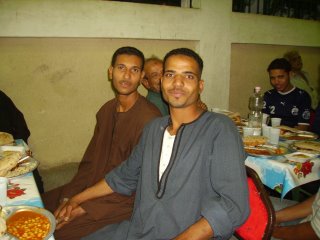
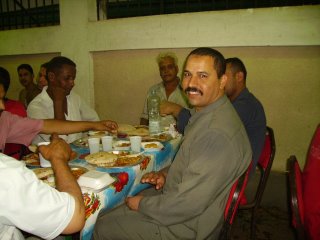
4 comments:
Great story James--glad they insisted on the pics--it made it easier to imagine what this celebration is like. And you mentioned Betty! How sweet-- I shall get a copy to her. ki
What a cool experience, J. You're very lucky. The stuff memories are made of.
C.
Oh yum! That food looks so good. And my admiration to Mandy for eating the beef dish--something I wouldn't have been able to do. You two are the best kind of travelers: respectful, engaged, and curious.
Great story and pictures.
Love
Mom
Post a Comment